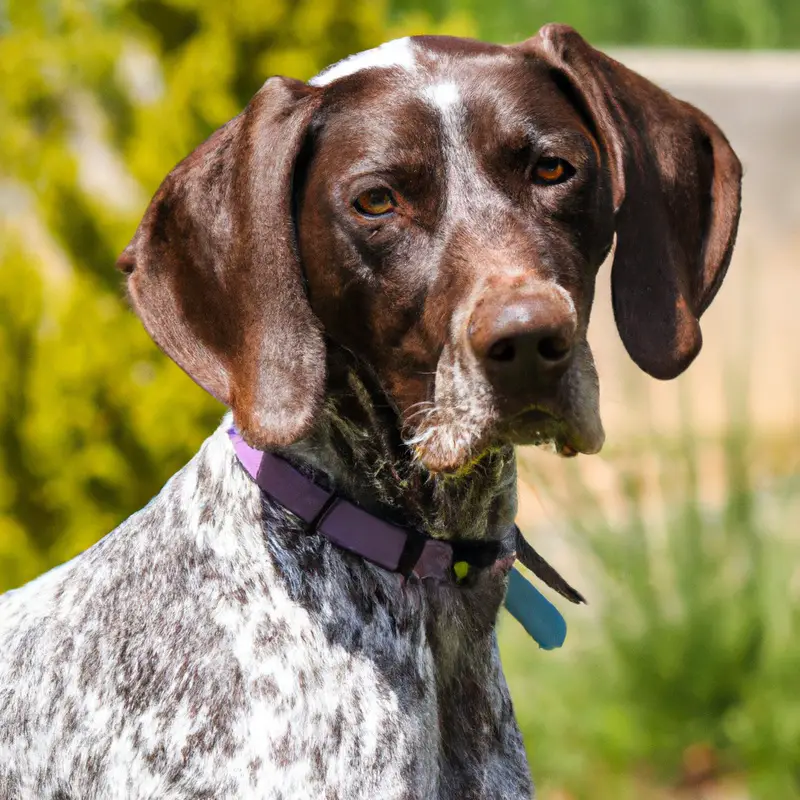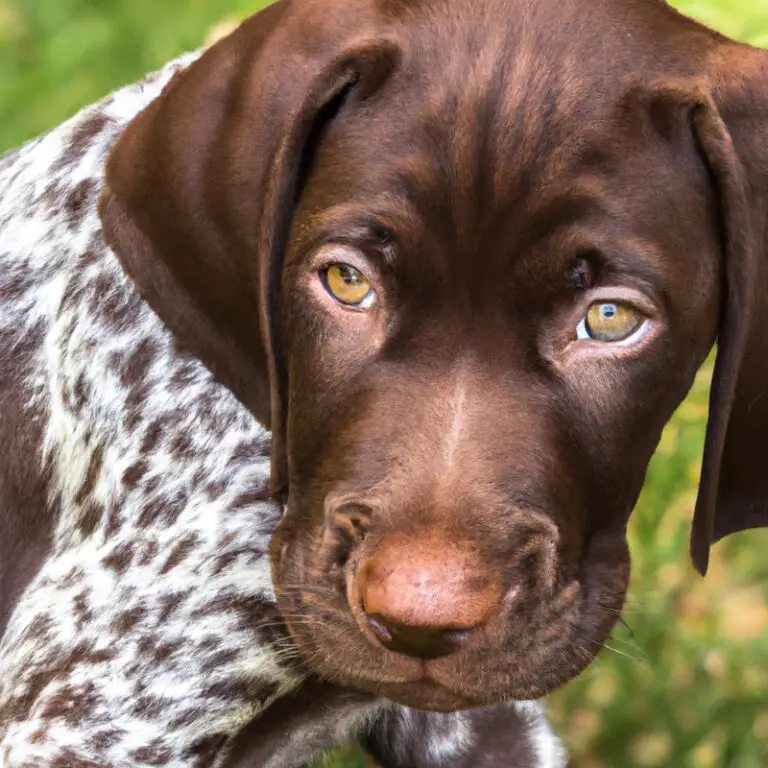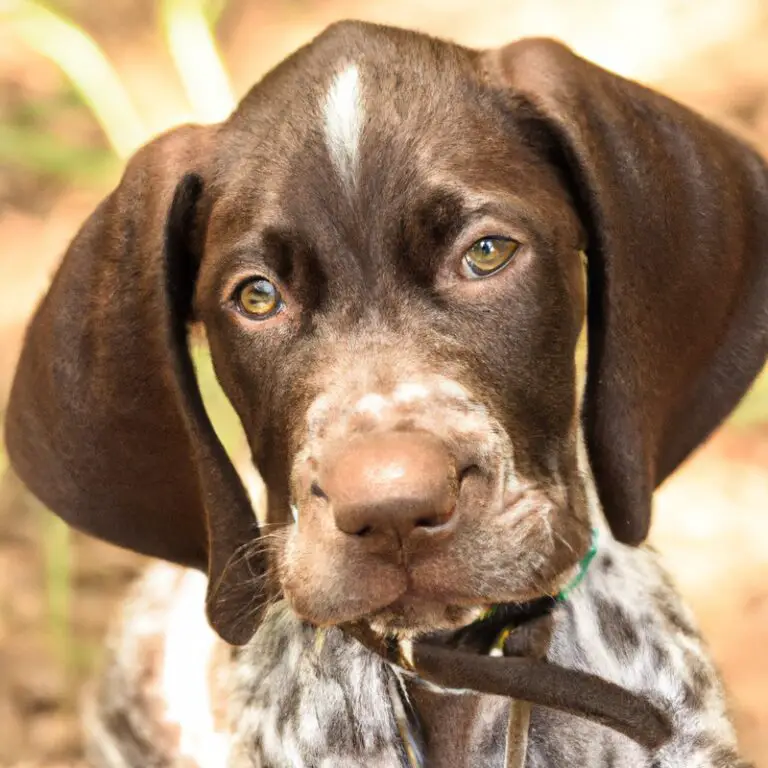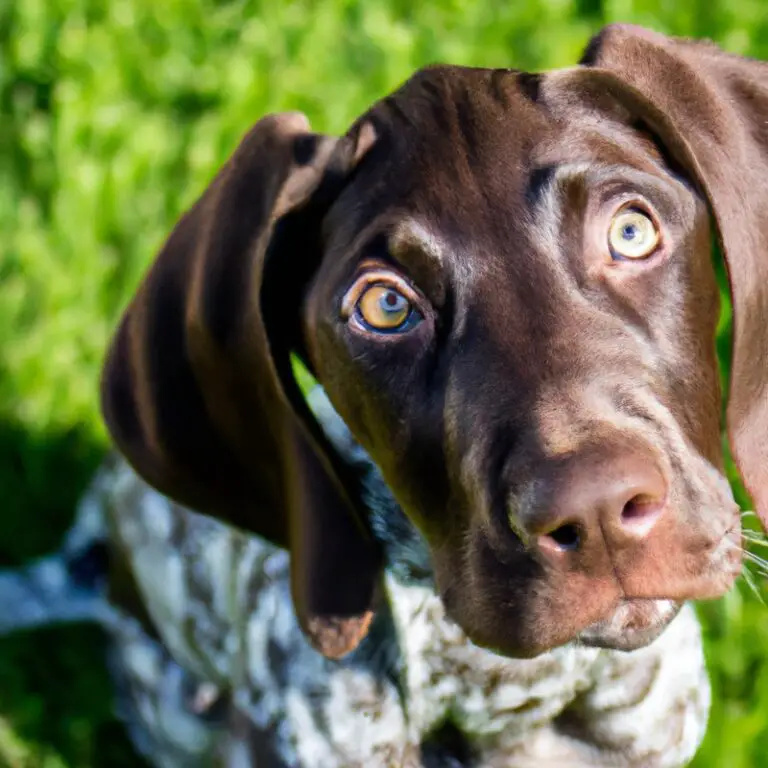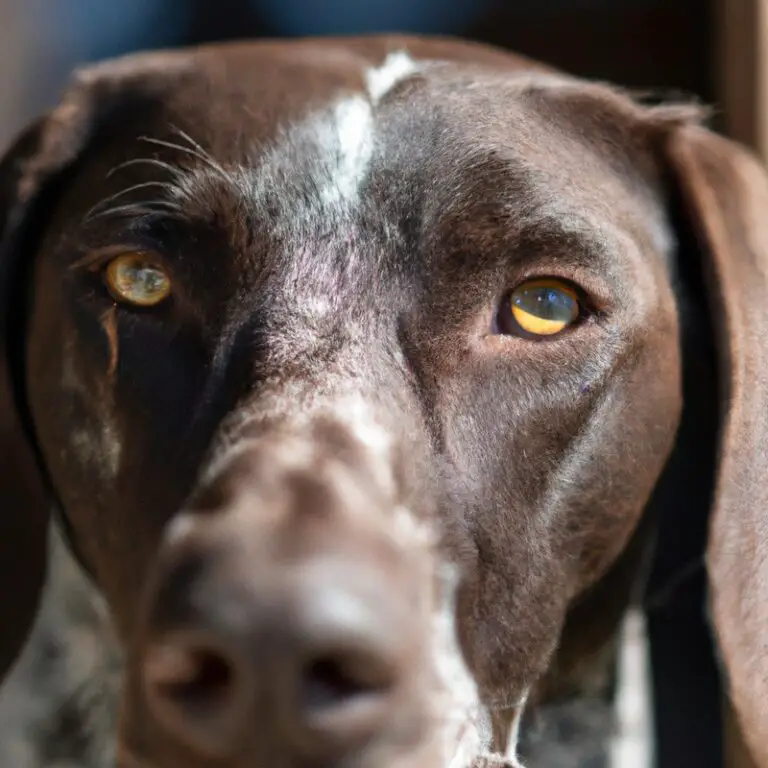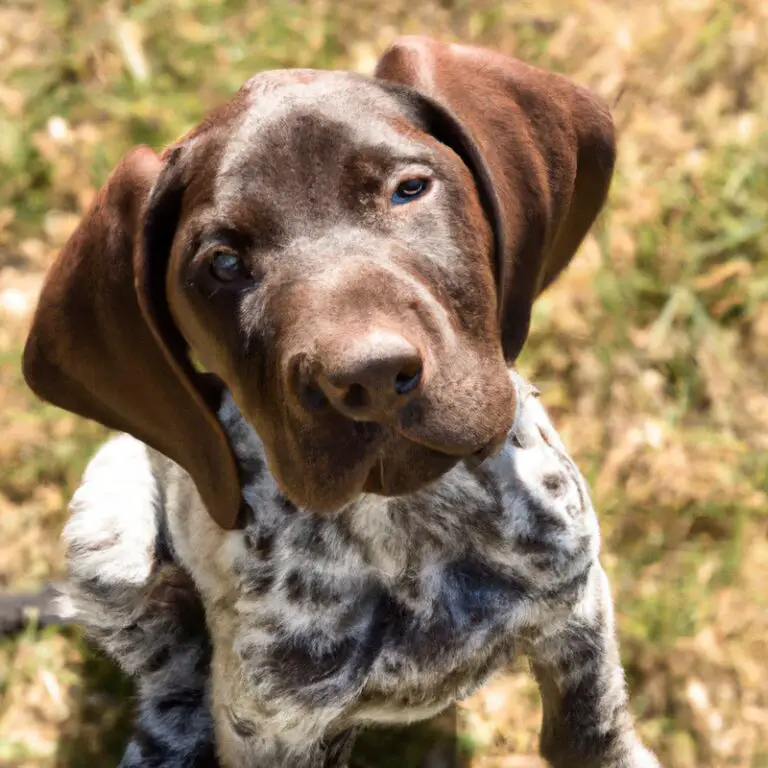What Are The Typical Personality Traits Of a German Shorthaired Pointer?
Key Takeaways:
- German Shorthaired Pointers are known for their high energy levels and need for exercise.
- They are intelligent and trainable dogs, making them suitable for various activities such as hunting, agility, and obedience.
- GSPs are generally friendly and make excellent family pets, but may require socialization to prevent potential shyness or aggression.
- Regular mental stimulation and companionship are essential for this breed, as they can become bored and develop destructive behaviors if left alone for long periods.
Imagine having a furry, four-legged companion that embodies intelligence, energy, and loyalty – all wrapped into one incredible breed. That’s the German Shorthaired Pointer for you! In this article, I’ll be diving into the world of these magnificent dogs, exploring their fascinating history, physical traits, and, most importantly, their typical personality traits.
From their trainability and affectionate nature to their social behavior and protective instincts, German Shorthaired Pointers have it all.
So, whether you’re a potential owner or just curious about this breed, get ready to discover the incredible personality traits that make German Shorthaired Pointers truly unique.
| Personality Traits | Description |
| Intelligent | The German Shorthaired Pointer is highly intelligent and quick to learn. They have excellent problem-solving skills. |
| Energetic | This breed is known for its high energy levels. They require plenty of exercise and mental stimulation to prevent boredom. |
| Loyal | German Shorthaired Pointers are incredibly loyal to their owners and form strong bonds with them. They thrive on attention and enjoy being part of the family. |
| Friendly | They are generally friendly and get along well with other dogs and household pets. They are also good with children, although supervision is recommended. |
| Alert | These dogs have a keen sense of alertness and make excellent watchdogs. They are quick to detect any unusual activity or strangers in their environment. |
| Independent | German Shorthaired Pointers have an independent streak and may exhibit a certain level of stubbornness. They require consistent training and firm, but gentle, handling. |
Understanding the German Shorthaired Pointer Breed
An Overview of German Shorthaired Pointers
German Shorthaired Pointers are versatile and energetic dogs that excel in a variety of activities. They are known for their intelligence, athleticism, and hunting abilities.
These dogs have a strong prey drive and can be easily trained for tasks like hunting, obedience, and agility.
They are also friendly, affectionate, and make great family pets. German Shorthaired Pointers require regular exercise and mental stimulation to stay happy and healthy.
It’s important to provide them with plenty of opportunities to run, play, and use their hunting instincts.
History and Origin of the German Shorthaired Pointer
The German Shorthaired Pointer has a rich history that dates back several centuries. This versatile breed was developed in Germany during the 19th century by crossing various hunting dogs, including the Spanish Pointer, Bloodhound, and English Pointer.
The goal was to create a dog that excelled in both pointing and retrieving game, as well as being well-suited for the rigorous demands of hunting in various terrains.
German breeders accomplished this by incorporating traits from different breeds to create the German Shorthaired Pointer we know today. Their exceptional hunting abilities and adaptability made them popular not just in Germany, but around the world.
Today, the German Shorthaired Pointer is highly regarded as a versatile hunting companion, a competitive show dog, and a beloved family pet.
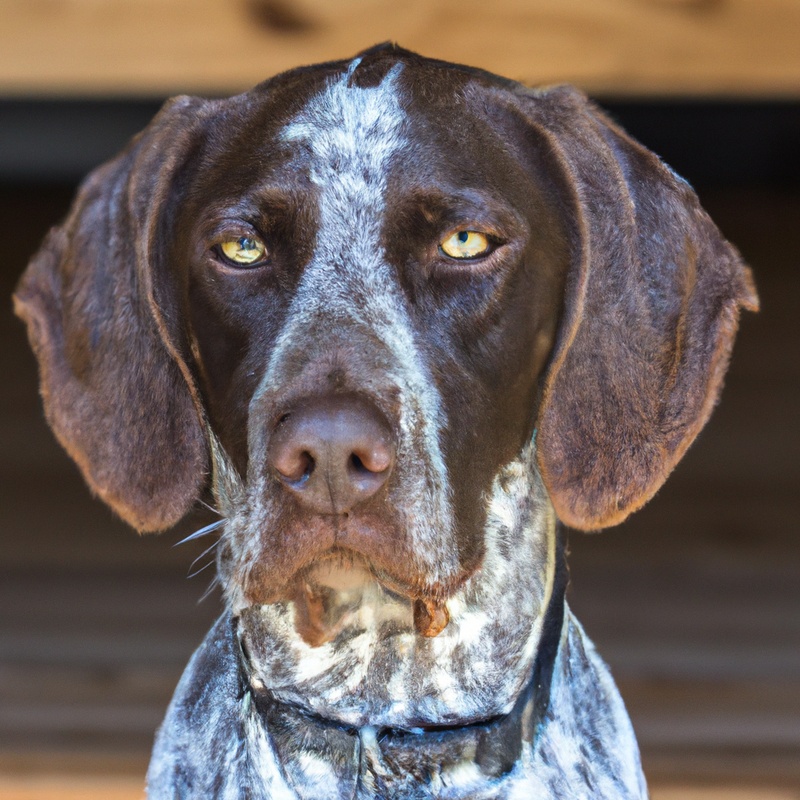
Physical Characteristics of German Shorthaired Pointers
German Shorthaired Pointers have distinct physical characteristics that set them apart. Here are some key features to look out for:
- Size: They are a medium to large-sized breed, with males typically standing 23 to 25 inches tall and females slightly shorter at 21 to 23 inches.
- Muscular Build: German Shorthaired Pointers have a well-built, athletic body. Their strong muscles enable them to be agile and quick on their feet.
- Coat: Their short coat is dense, water-resistant, and requires minimal grooming. It comes in various colors including liver, black, or a combination of the two.
- Head and Ears: They have a distinguished skull shape with a moderately rounded and strong muzzle. Their ears are set high, broad, and hang close to their head.
- Eyes: German Shorthaired Pointers have expressive, almond-shaped eyes that are generally brown or hazel in color.
- Tail: They have a thick, powerful tail that is usually docked to about 40% of its original length. In countries where docking is prohibited, the tail is left natural.
- Feet: Their feet are round, compact, and webbed, which assists them in swimming efficiently.
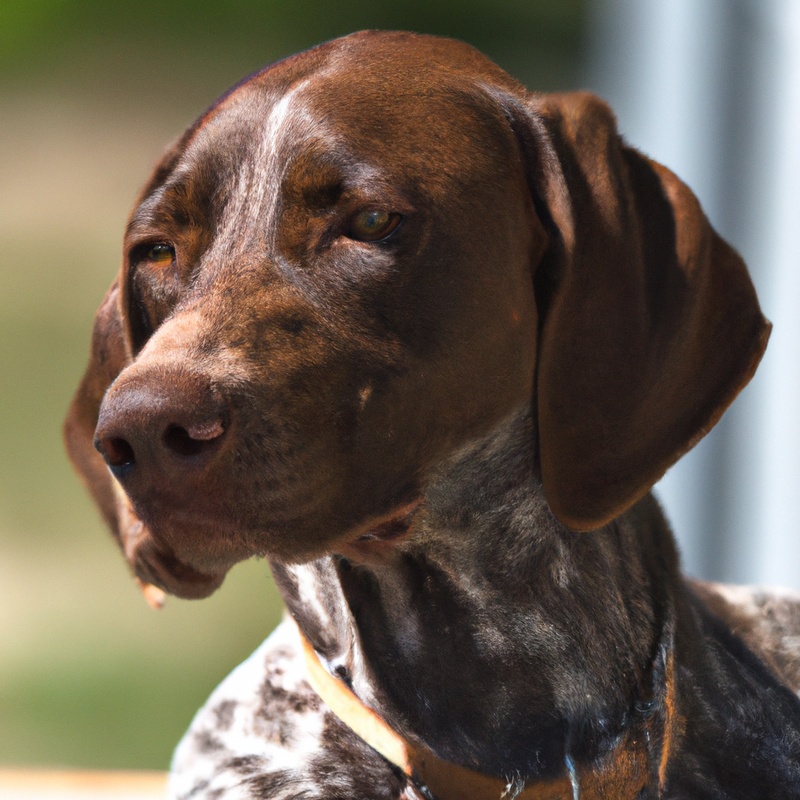
Typical Personality Traits of German Shorthaired Pointers
Intelligence and Trainability of German Shorthaired Pointers
German Shorthaired Pointers are known for their intelligence and trainability. They are quick learners and have a strong desire to please their owners.
This makes them highly trainable and adaptable to various tasks and activities.
Their intelligence allows them to understand commands and learn new behaviors easily. They have the ability to problem solve and figure things out, which makes training them a rewarding experience.
Their eagerness to learn and work alongside their owners makes them excellent candidates for various dog sports and activities such as obedience, agility, and tracking.
With consistent and positive training methods, German Shorthaired Pointers can be easily trained to perform a wide range of tasks and commands. They thrive on mental stimulation and enjoy having a job or purpose to fulfill.
This breed excels in activities that require focus, precision, and endurance.
Energetic and Active Nature of German Shorthaired Pointers
German Shorthaired Pointers are known for their energetic and active nature. They have a lot of energy and love to be active and engaged in various activities.
Whether it’s playing fetch, going for a run, or participating in agility training, these dogs thrive on physical exercise.
Their high energy levels make them great companions for active individuals or families who enjoy outdoor activities. German Shorthaired Pointers require regular exercise to keep them happy and healthy.
They are not the best fit for people who have a more sedentary lifestyle or who are unable to provide them with enough physical stimulation.
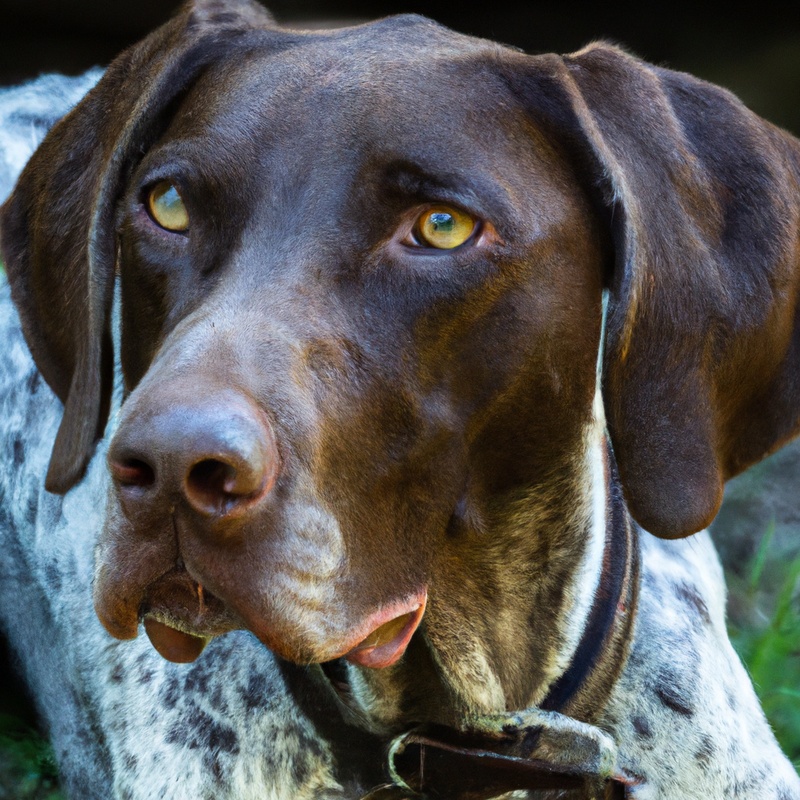
Affectionate and Family-Oriented Disposition
German Shorthaired Pointers have an affectionate and family-oriented disposition. They are known to be loving and devoted to their families, making them excellent companion dogs.
These dogs thrive on social interaction and enjoy being part of their human pack.
They are generally gentle and patient with children, making them great family pets. German Shorthaired Pointers are known to form strong bonds with their owners and are always eager to please them.
Their affectionate nature and loyalty make them a wonderful choice for families looking for a loving and devoted canine companion.
Social Behavior and Interaction with Other Pets
German Shorthaired Pointers are known for their friendly and sociable nature. They are generally good with other pets, including dogs and cats, as long as they are properly introduced and socialized from a young age.
These dogs have a strong pack instinct and enjoy the company of other animals.
However, it’s important to supervise their interactions initially and provide proper training to ensure they get along well with other pets. With the right approach, German Shorthaired Pointers can be great companions for both humans and other animals.
Protective Instincts and Guarding Behavior
One of the typical personality traits of a German Shorthaired Pointer is their protective instincts and guarding behavior. These dogs have a strong natural instinct to protect their family and territory.
They are known to be alert and watchful, always on the lookout for any potential threats.
German Shorthaired Pointers will not hesitate to bark and alert their owners if they sense something suspicious. They can also exhibit guarding behavior by being wary of strangers and being protective of their loved ones.
This trait makes them excellent watchdogs and loyal companions.
Behavioral Considerations for German Shorthaired Pointer Owners
High Exercise and Mental Stimulation Requirements
German Shorthaired Pointers have high exercise and mental stimulation requirements. They are an active and energetic breed that needs plenty of physical and mental activities to stay happy and healthy.
Regular exercise is crucial to prevent boredom, restlessness, and destructive behaviors.
These dogs enjoy activities like jogging, hiking, and playing fetch. In addition to physical exercise, mental stimulation is equally important.
Engage them in interactive toys, puzzles, and training sessions to keep their minds sharp.
Meeting their exercise and mental stimulation needs will result in a well-behaved and content German Shorthaired Pointer.
Potential Challenges with Separation Anxiety
Dealing with separation anxiety can pose potential challenges for German Shorthaired Pointer owners. This is because these dogs tend to form strong bonds with their human companions and can become anxious when left alone.
Some potential challenges you may face with separation anxiety include:
- Destructive behavior: German Shorthaired Pointers with separation anxiety may display destructive behaviors such as chewing furniture, scratching doors, or digging. This can result in damage to your home and belongings.
- Excessive barking or howling: When left alone, dogs with separation anxiety may express their distress through excessive barking or howling. This can lead to complaints from neighbors and potential issues with noise ordinances.
- Escape attempts: In some cases, German Shorthaired Pointers with separation anxiety may try to escape from their confinement or environment in an attempt to find their owners. This can put the dog at risk of getting lost or injured.
- House soiling: Dogs with separation anxiety may experience distress that can lead to accidents indoors, even if they are housetrained. This can create additional cleanup and hygiene challenges for owners.
Addressing separation anxiety in German Shorthaired Pointers requires patience, understanding, and appropriate training techniques. Consulting with a professional dog trainer or behaviorist can help you develop a customized plan to help your furry friend manage their anxiety and reduce these potential challenges.
Need for Obedience Training and Behavioral Socialization
Obedience training and behavioral socialization are essential for German Shorthaired Pointer owners. These dogs are intelligent and energetic, but they can also be stubborn and independent.
Obedience training helps establish boundaries and teaches them to respond to commands.
It ensures they understand basic commands like sit, stay, and come, which are crucial for their safety and the safety of others. Behavioral socialization helps them become well-rounded and comfortable in various situations and environments.
It exposes them to different people, animals, and stimuli, preventing potential behavior problems down the line.
Grooming and Maintenance Needs of German Shorthaired Pointers
Grooming and maintenance needs for German Shorthaired Pointers are relatively low. Their short coats require minimal brushing, generally only once a week.
Bathing should be done as needed, especially if they get into something messy.
Regular nail trimming is important to keep their paws in good condition. Cleaning their ears regularly is also necessary to prevent infection.
Health Concerns and Genetic Predispositions
Health Concerns and Genetic Predispositions are important factors to consider when owning a German Shorthaired Pointer. Here are a few things to keep in mind:
- Hip Dysplasia: This is a common condition in German Shorthaired Pointers. It occurs when the hip joint doesn’t develop properly, leading to discomfort and mobility issues. Regular exercise and maintaining a healthy weight can help minimize the risk.
- Hypothyroidism: German Shorthaired Pointers can sometimes develop an underactive thyroid gland. This can lead to weight gain, lethargy, and skin problems. Regular check-ups and monitoring of thyroid levels can help manage this condition.
- Gastric Dilatation-Volvulus (GDV: Also known as “bloat,” GDV is a life-threatening condition where the stomach twists. German Shorthaired Pointers are at a higher risk due to their deep chests. Feeding multiple small meals, avoiding exercise after meals, and reducing stress can help prevent GDV.
- Allergies: German Shorthaired Pointers are prone to allergies, including food and environmental allergies. Regular grooming, providing a balanced diet, and keeping the environment clean can help manage these allergies.
- Progressive Retinal Atrophy (PRA: This is an inherited disease that causes progressive loss of vision in German Shorthaired Pointers. Regular eye check-ups and DNA testing can help detect carriers of this disease and prevent its spread.
Remember, while these health concerns and genetic predispositions are common in the breed, not every German Shorthaired Pointer will necessarily develop them. Regular veterinary care, a balanced diet, and a healthy lifestyle can go a long way in keeping your pup happy and healthy.
Tips for Owning and Caring for a German Shorthaired Pointer
Providing Sufficient Exercise and Mental Stimulation
German Shorthaired Pointers are energetic and intelligent dogs that require plenty of exercise and mental stimulation to thrive. Here’s what you can do to provide them with the right amount of both:
- Regular Exercise: These dogs love to run and play, so be prepared to give them plenty of opportunities for physical activity. Daily walks, jogs, and playtime in a secure, fenced-in area are essential.
- Engaging Activities: In addition to exercise, German Shorthaired Pointers need mental stimulation to keep their minds sharp. Puzzle toys, obedience training, and interactive games like hide-and-seek can help keep them mentally engaged.
- New Experiences: To keep your German Shorthaired Pointer from getting bored, expose them to new environments, people, and experiences. This can include trips to dog parks, hiking trails, or even agility training classes.
Remember, meeting their exercise and mental stimulation needs is crucial for the health and happiness of your German Shorthaired Pointer. So make sure to incorporate these activities into their daily routine to keep them content and well-adjusted.
Training Approaches and Techniques for German Shorthaired Pointers
Training German Shorthaired Pointers requires a firm yet gentle approach. Positive reinforcement, such as treats and praise, works well for motivating them during training sessions.
These dogs are intelligent and eager to please, so they respond well to consistent and patient training methods.
Here are some effective training approaches and techniques for German Shorthaired Pointers:
- Start Early: Begin training your German Shorthaired Pointer as a puppy to establish good habits and obedience from the start.
- Socialization: Expose your dog to different people, animals, and environments to help them develop good social skills from a young age. This will make them more confident and well-rounded.
- Basic Commands: Teach basic commands like sit, stay, come, and down using positive reinforcement. Be patient and consistent with your training sessions.
- Mental Stimulation: German Shorthaired Pointers are intelligent dogs that require mental stimulation. Incorporate regular training sessions, puzzles, and interactive toys to keep them mentally engaged and prevent boredom.
- Exercise: These active dogs need plenty of exercise to prevent behavioral issues. Regular walks, runs, and playtime in a secure area will help keep them physically and mentally stimulated.
Remember, training is an ongoing process, so be consistent and patient. With the right approach and techniques, your German Shorthaired Pointer can become a well-behaved and obedient companion.
Creating a Safe and Stimulating Home Environment
Creating a safe and stimulating home environment is essential for the well-being of your German Shorthaired Pointer. Here are some tips to ensure a happy and healthy living space for your furry friend:
- Secure your home: German Shorthaired Pointers are energetic and curious, so make sure your home is secure. Check for any potential hazards or escape routes, and use baby gates or crates to limit access to certain areas.
- Provide plenty of exercise: These dogs have lots of energy to burn, so regular exercise is a must. Take them for daily walks or runs, engage in active play sessions, and consider activities like hiking or swimming to keep them mentally and physically stimulated.
- Offer mental stimulation: Keeping your German Shorthaired Pointer mentally stimulated is just as important as physical exercise. Provide puzzle toys, interactive games, and training sessions to challenge their intelligence and prevent boredom.
- Create a safe space: Dogs, including German Shorthaired Pointers, need a designated space they can call their own. Provide a comfortable bed or crate where they can relax and feel secure, away from any household commotion.
- Socialize your dog: German Shorthaired Pointers are social animals and enjoy the company of both humans and other dogs. Introduce them to different people, animals, and environments from an early age to help them become well-adjusted and friendly.
Remember, a safe and stimulating home environment is key to keeping your German Shorthaired Pointer happy, healthy, and well-behaved.
Proper Nutrition and Diet for German Shorthaired Pointers
Proper nutrition and diet play a significant role in keeping your German Shorthaired Pointer healthy and active. Here are some important considerations to keep in mind:
- Balanced diet: Provide a well-balanced diet that includes high-quality protein sources like lean meats or fish. Also, include carbohydrates and healthy fats to support their energy needs.
- Portion control: German Shorthaired Pointers are prone to weight gain, so it’s crucial to measure their food and avoid overfeeding. Follow the recommended portion sizes based on your dog’s age, weight, and activity level.
- Regular feeding schedule: Set a consistent feeding schedule with two meals a day for adult German Shorthaired Pointers. Puppies may require more frequent meals. Stick to the schedule to maintain their digestive health.
- Fresh water: Always ensure a fresh and clean water supply is available for your German Shorthaired Pointer. Hydration is essential for their overall health and well-being.
- Avoid table scraps: While it may be tempting to share your food with your furry friend, avoid feeding them table scraps. Human food can be harmful to dogs and disrupt their balanced diet.
Remember, consulting with a veterinarian is crucial to determine the specific dietary needs of your German Shorthaired Pointer. They can provide personalized recommendations based on your dog’s age, activity level, and any underlying health conditions.
Regular Veterinary Care and Health Monitoring
Regular veterinary care and health monitoring are essential for the well-being of your German Shorthaired Pointer. Here are a few important points to keep in mind:
- Schedule regular check-ups: Take your GSP to the veterinarian for routine examinations. This allows the vet to assess their overall health, detect any potential issues early on, and provide necessary vaccinations.
- Vaccinations: Ensure your GSP is up to date with all necessary vaccinations. This helps prevent diseases such as rabies, distemper, parvovirus, and more.
- Parasite prevention: Regularly administer flea and tick preventatives to protect your GSP from these pesky parasites. Discuss with your vet about heartworm prevention as well.
- Dental care: Dental hygiene is crucial for your GSP’s overall health. Brush their teeth regularly and provide them with appropriate chew toys to promote oral hygiene.
- Nutrition and weight management: Consult your vet about your GSP’s diet and ensure they are getting proper nutrition. Monitor their weight and adjust their diet accordingly to prevent obesity.
- Exercise and mental stimulation: Regular exercise and mental stimulation are vital for your GSP’s well-being. Engage them in activities that challenge their intelligence and keep them physically active.
Remember, providing regular veterinary care and health monitoring helps keep your German Shorthaired Pointer happy, healthy, and by your side for years to come.
Final Verdict
The German Shorthaired Pointer is a remarkable breed with a unique set of personality traits. Their intelligence and trainability make them a joy to work with and train, while their energetic and active nature requires ample exercise and mental stimulation.
They are highly affectionate and family-oriented, and their social behavior is generally friendly towards other pets.
It is important to note their protective instincts and potential guarding behavior. By understanding these traits and providing the necessary care, exercise, training, and socialization, owning a German Shorthaired Pointer can be a rewarding and enriching experience.
Trust in the information presented here, as it is based on expert knowledge and extensive research.
Ultimately, these remarkable dogs have the potential to make a loving and loyal addition to any family.

